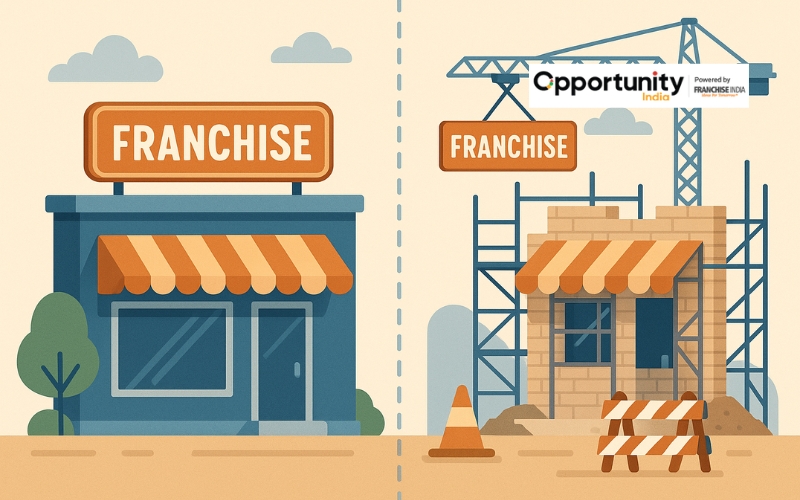
Are you planning to enter the thriving franchise industry? Let us tell you that franchisees are an excellent way to launch a business with a successful business plan and established brand recognition. But now for the crucial question: Should you take a chance on a new, up-and-coming brand or stick with an established franchise that has been in business for years? This choice has the power to influence your entire entrepreneurial path. Let's break down everything in this article.
Franchising: Understanding the Basics
Aspiring business owners who want to own a business but whose risk tolerance is smaller than that of starting from scratch are increasingly choosing franchising. The franchising idea has made it possible for thousands of people to join well-known brand networks or place bets on up-and-coming stars in everything from fast-food chains to educational institutions. However, there is still a significant question: should you risk your money on a developing franchise or choose an established one?
Also Read: How to Start an Embroidery Business in India?
Many people are drawn to the idea of owning their own business, and franchising frequently seems like an alluring route to success. It offers a possibly lower risk entry into the industry than starting from scratch by combining an established infrastructure with an entrepreneurial mentality. However, a crucial choice lies ahead for potential franchisees in the broad realm of franchising: should they choose an innovative, up-and-coming idea with room to grow quickly, or invest in a well-known, long-standing brand?

What is an Established Franchise?
A business that has a well-known brand, significant operations, and a tested franchise idea is considered an established franchise. McDonald's, Subway, KFC, Domino's, and other well-known brands are a few examples. These companies have streamlined processes and have been tested in a variety of areas.
What is an Emerging Franchise?
New or expanding brands that might not be well-known or have little market presence are known as emerging franchises. Within a year or five of introducing their franchise model, these businesses are still in the early phases of franchising. Consider newer businesses in specialized markets such as boutique fitness centers, vegan eateries, or tech-enabled service providers.
Also Read: Honey Bee Farming Business Plan in India
Established Franchises: The Allure of a Proven Path
For good reason, purchasing an established franchise frequently seems like a safer option. The benefits are strong:
Strong Customer Base and Brand Recognition
You're not starting from scratch when you open an existing franchise. There is already a demand for the brand's goods and services, and customers are familiar with it and believe in its quality. Immediate brand awareness is the most evident benefit of an established franchise. Customers are already aware of what to anticipate from your outlet or store. This can result in faster revenue creation and drastically less initial marketing effort. The immediate difference in consumer flow between opening a Starbucks and a new coffee shop is striking.
Reliable Business Model and Operational Systems
Well-known franchisors have honed their business models over the years, sometimes even millions of dollars. They offer complete, tried-and-true solutions for marketing, supply chain management, staff training, customer service, site selection, and build-out. A "turnkey" operation is provided to you, reducing uncertainty and trial-and-error.
Also Read: 3 Powerful Reasons to Own a Pet Franchise
Easy Access to Financing
Due to their established track record and lower perceived risk, banks and lenders are typically more at ease lending to franchisees. This can greatly ease the process of obtaining the funds required for your investment.
Economies of Scale and Negotiating Power
You gain from group purchasing power when you're a part of a big franchise system. Franchisees save money as a result of the advantageous agreements that franchisors frequently strike with suppliers of goods, equipment, and services.
Decreased Risk of Failure
Franchises, particularly well-established ones, often have a far lower failure rate than independent startups, even if no business endeavor is completely risk-free. When compared to independent enterprises, franchisees often have a much greater five-year survival rate, according to statistics. This is mostly because of the established infrastructure, built-in support, and brand awareness.
Emerging Franchises: The Thrill of Being on the Ground Floor
New franchises provide a distinct attraction based on expansion and opportunity:
- Reduced Initial Investment: Compared to an established franchise, an emerging franchise typically has lower initial franchise fees and overall beginning costs. Due to this, entrepreneurs with less money can access them more easily.
- Increased Access to Prime Territories: Desired locations in unexplored markets are more likely to be secured because the brand is still growing. As the brand becomes more well-known, this may result in substantial development potential.
- Possibility of Huge Growth and Equity: As an early adopter, you stand to gain a great deal if a new franchise succeeds. As the brand grows and achieves greater success, the value of your franchise unit may increase significantly. You're getting a head start on what might turn out to be the "next big thing."
- Greater Influence and Cooperation with the Franchisor: New franchisors frequently have tighter ties with their original partners because they have a smaller network of franchisees. More chances to offer input, have an impact on system development, and establish a solid connection with the leadership team may result from this.
- Innovation & Novel Concepts: Developing franchises frequently embody innovative concepts, utilizing new technologies or adapting to changing consumer tastes. Entrepreneurs who wish to be at the forefront of industry trends may find this interesting.

Key Factors to Consider When Making Your Decision
Several important criteria influence the decision to choose an established or emerging franchise, which is quite personal:
How Much Risk Are You Able to Take?
-
High Risk Tolerance: An emerging franchise can be a good fit for you if you're at ease with uncertainty and thrilled by the prospect of big rewards.
-
Low Risk Tolerance: An established franchise is probably more appropriate if you value consistency, predictability, and a tried-and-true approach.
Financial Resources
-
Substantial Capital: An established franchise becomes more accessible if you have a significant sum of money on hand.
-
Limited Funds: New franchises frequently provide a reduced barrier to entry, making business ownership more accessible. Don't forget to account for working capital and other recurring costs in addition to the initial price.
Also Read: 9 Profitable Recycling Business Ideas
Entrepreneurial Style and Personality
- Independent and Creative: An emerging franchise may provide additional opportunity for participation if you thrive on creativity, problem-solving, and a drive to influence the business.
- System-Oriented and Rule-Follower: An established franchise will better suit your style if you like a clear framework and feel at ease according to set protocols.
Industry Trends and Future Viability
For both, look into the industry as a whole. Is it expanding or contracting? Will there be any disruptive innovations shortly? Select a franchise in a market with steady demand.
Market Research and Due Diligence
No matter the kind of franchise, due diligence and market research are crucial.
- Speak with current and former franchisees: Possibly the most important step is this one. Inquire about their profitability, the degree of assistance they receive, the responsiveness of the franchisor, any unforeseen expenses, and whether they would repeat the business. Don't limit your conversation to the people the franchisor suggests; look for others on your own.
- Assess Market Saturation: Determine whether there is still an opportunity for expansion by evaluating the competition in your target market.
- Understand Franchisor Stability: Research the franchisor's financial health and management team.
Conclusion
Franchising is among the easiest ways to start a business. The most essential thing is to match your choice with your values, objectives, and way of life, regardless of whether you choose a well-known brand or an innovative startup. Remember to complete your assignments as well. Speak with other franchisees, review the fine print, and perhaps spend a month or two working for a business that is similar to yours. Your journey will go more smoothly the more you know. Whatever path you choose, you're making a daring move toward independence, and that's something to be proud of.

